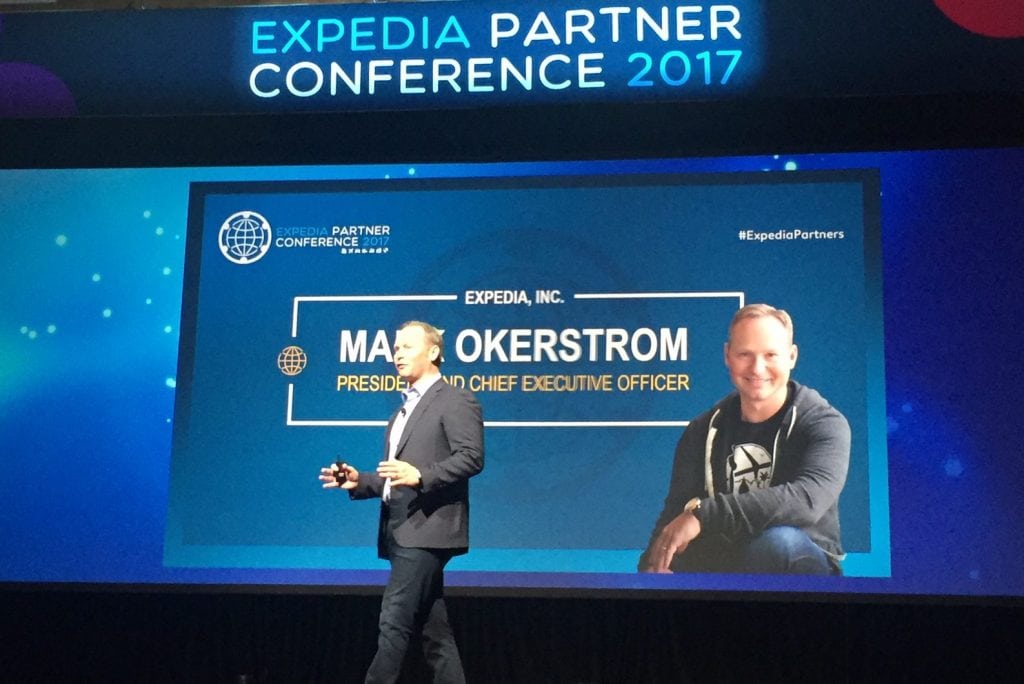Skift Take
Expedia isn't done trying to grow; that would be suicide for any public company. Instead, Expedia argues it can best spur growth by digging in deeper in countries where it already operates rather than expanding its map. The new strategy boils down to a question of priorities, and could change again in coming years.
Conquering the world? According to Expedia Inc. CEO Mark Okerstrom, the company’s been there, and is nearly finished doing that.
Specifically, Okerstrom argues that the effort that has consumed his company over the last nearly two decades — opening offices and operating points of sale in an-ever-increasing number of global locations — is just about finished.
“The land grab for being present across the world, we have almost completed it,” Okerstrom told nearly 5,000 attendees Wednesday at the Expedia Partner Conference in the Aria Resort & Casino in Las Vegas.
After all, Expedia Inc. companies, including Expedia.com, Hotels.com and HomeAway, for example, offered 350,000 hotels and more than 1.2 million vacation rentals that can be booked online in 200 countries as of the end of 2016.
Okerstrom said there are a few more countries where Expedia wants to “plant some flags,” but the global expansion race in terms of adding countries is nearly over.
This is significant attitude shift for a company that entered 2017 — under former CEO Dara Khosrowshahi — with a motto calling for Expedia to “go global.”
After Expedia acquired Travelocity, Orbitz Worldwide and HomeAway in 2015, it became more U.S.-focused in terms of its revenue sourcing. In the third quarter of 2017, Expedia generated 53 percent of its revenue in the United States.
Okerstrom, who succeeded Khosrowshahi in September, isn’t saying that Expedia should abandon global growth. Instead, he’s arguing that the company should go deeper in the geographies where it already has a presence in terms of adding hotels and diversifying its available payment systems.
That means instead of focusing on adding pins to a map, Expedia seeks to become more locally relevant, Okerstrom said. For example, Malaysian travelers should feel like Expedia is a Malaysian travel agency in their country, he added.
Actually, Okerstrom views getting deeper locally as a way to accelerate Expedia’s global growth.
This doesn’t mean that Expedia is finished with acquisitions to spearhead growth, although Okerstrom, in another shift from the Khosrowshahi era, wants to emphasize organic growth instead.
Three Priorities for Expedia in 2018
Expedia’s altered growth strategy — going deep locally rather than going wider and launching operations in new countries — is one of three key priorities for Expedia in 2018, Okerstrom said. The other two are becoming more customer-centric, and speeding the pace of innovation within the company.
One way to become more customer-centric, for example, would be to rebook customers’ connecting flights for them while they are still in the air if their flights would be arriving late, Okerstrom said. Expedia’s corporate travel unit, Egencia, already does this for business travelers,and Expedia wants to add this service for leisure travelers, Okerstrom said.
Okerstrom said Expedia will be accelerating its use of artificial intelligence to render itself more relevant to customers. If customers vacation in the same destination and hotel every year, for example perhaps Expedia could send them an email recommending a different destination or hotel based on past behavior and preferences, he said.
Okerstrom described Expedia and online travel as ripe for robust growth. He cited travelers in some destinations “leapfrogging” technology — transitioning from offline travel bookings, skipping the desktop, and getting everything they need on their mobile phones — as an encouraging sign.
In addition, the global travel industry will have notched $1.6 trillion in global travel spend in 2017, Okerstrom said, characterizing it as almost an “act of defiance” in an era characterized by travel bans, sporadic acts of terrorism, and the mass shooting in Las Vegas.
However, Okerstrom, in making his pitch to Expedia’s partners in the audience, didn’t touch on the company’s third quarter challenges. The stock was trading at around $148 per share before the company announced earnings October 26, and it closed at $119.17 Wednesday.
In the third quarter, Expedia recorded an $8 million loss. Its results were adversely impacted by excessive marketing spend at its Trivago hotel-search unit; a $15 million to $20 million profit hit from hurricanes and earthquakes, as well as ramped up marketing spend and increased technology costs at its HomeAway subsidiary.
The Daily Newsletter
Our daily coverage of the global travel industry. Written by editors and analysts from across Skift’s brands.
Have a confidential tip for Skift? Get in touch
Tags: expedia, otas, personalization
Photo credit: Expedia CEO Mark Okerstrom told nearly 5,000 attendees at the Expedia Partner Conference at the Aria Resort & Casino in Las Vegas that Expedia would no longer focus on adding new countries to its operations roster. Skift
